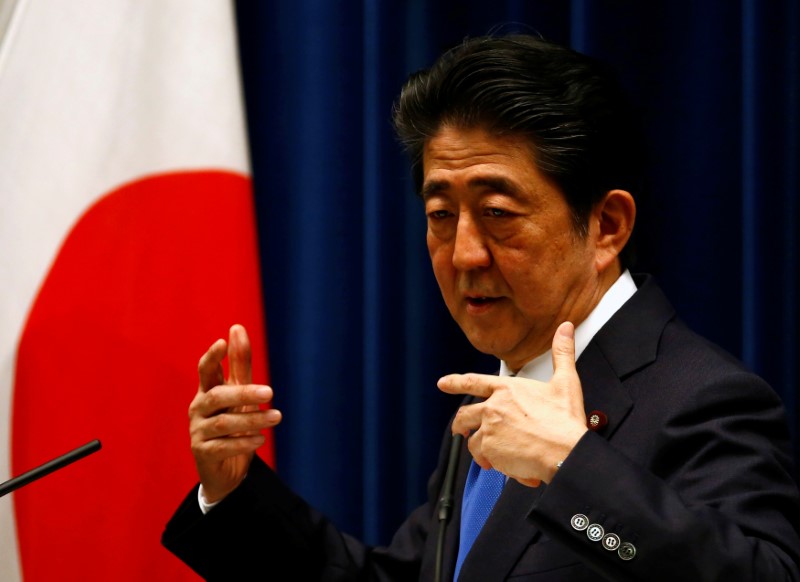 © Reuters. Japan’s Prime Minister Shinzo Abe attends a news conference at his official residence in Tokyo
© Reuters. Japan’s Prime Minister Shinzo Abe attends a news conference at his official residence in TokyoBy Tetsushi Kajimoto and Takaya Yamaguchi
TOKYO (Reuters) – Japan’s ruling bloc approved a plan on Thursday to slash the corporate tax rate to around 20 percent from 30 percent – but only for companies that raise wages aggressively and boost domestic capital spending.
The carrot-and-stick approach is Prime Minister Shinzo Abe’s most aggressive step yet to convince companies to lift wages 3 percent, which he believes is needed to stimulate consumer spending and vanquish the deflation that has plagued Japan for nearly two decades.
Qualifying companies would also need to substantially boost investment in factories and equipment.
The proposal, which would be effective for three years from fiscal 2018, needs parliamentary approval to be enacted.
It would bring real tax rates for qualifying companies in line with an average of around 23 percent among Organisation for Economic Cooperation and Development members, through greater deductions.
But analysts are skeptical that the tax breaks will prompt Japanese firms to spend some of their record cash piles on higher worker pay amid concerns about the country’s shrinking population and prospects for low growth.
“Policy tax breaks are put in place only for a specified period of time, therefore they are unlikely to encourage firms to boost permanently fixed costs such as base pay,” said Koya Miyamae, senior fiscal analyst at SMBC Nikko Securities.
A recent Reuters poll of 230 big and mid-sized businesses found that two-thirds of respondents think Abe’s wage rise target of 3 percent is unrealistic.
The annual tax code revision is expected to be endorsed by Abe’s cabinet and submitted to parliament early next year for approval by April 1, the start of the next fiscal year.
TAX HIKES
Abe’s ruling bloc also approved a raft of tax hikes for coming years to pay for a bulging welfare bill, at the risk of putting a damper on private consumption.
The government expects a rise in personal income tax effective in 2020 to bring in some 90 billion yen ($800 million) in additional annual tax revenue.
The tax increase will be realized through cuts in deductions for salaried workers earning more than 8.5 million yen annually, except those with children or other family members in need of care.
Basic deductions for all earners will be expanded to encourage more work flexibility.
The tobacco tax will be hiked by 3 yen per cigarette or 60 yen a pack in stages over the next four years, the first such increase since 2010. Taxes will also rise on “heat-not-burn” tobacco in stages over the next five years.
In addition, the ruling bloc agreed to adopt a departure tax of 1,000 yen on people leaving Japan to enhance infrastructure for tourism, starting in 2019.
It also agreed to adopt an additional residential tax of 1,000 yen to fund conservation of forests from April 2024.
Fusion Media or anyone involved with Fusion Media will not accept any liability for loss or damage as a result of reliance on the information including data, quotes, charts and buy/sell signals contained within this website. Please be fully informed regarding the risks and costs associated with trading the financial markets, it is one of the riskiest investment forms possible.
Source: Investing.com





























